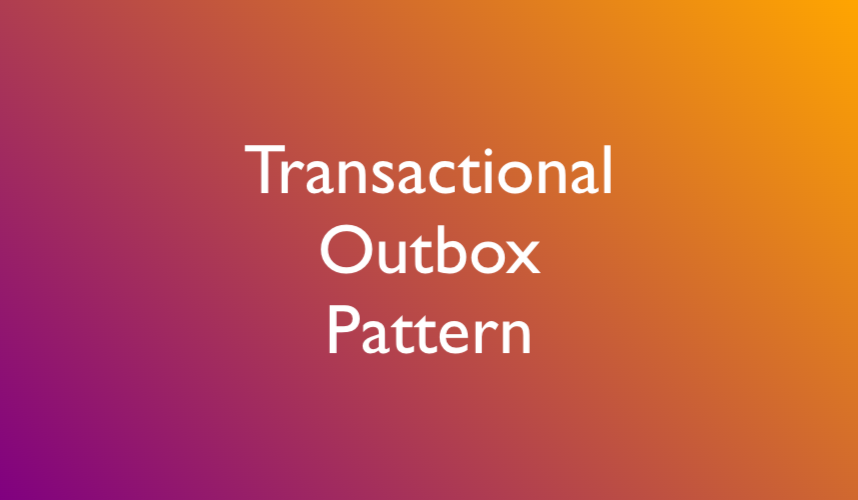Mastering the Transactional Outbox Pattern: A Deep Dive with Code, Pitfalls, and Best Practices
Keep your data consistent and your events reliable, even when things go sideways
Keep your data consistent and your events reliable, even when things go sideways

Imagine this: Your e-commerce app processes an order, saves it to the database, and tries to publish an OrderCreated event to notify other services. But what if the database commit succeeds, and the event publish fails? Suddenly, inventory isn’t updated, payment isn’t processed, and your users are left hanging.
This is the dual-write problem: ensuring atomicity between database updates and event publishing. Enter the Transactional Outbox Pattern—a battle-tested solution to keep your system consistent. Let’s break it down!
The idea is simple but powerful:
No more half-baked states! If the transaction commits, the event is guaranteed to eventually publish.
import jakarta.persistence.*;
import java.time.LocalDateTime;
import java.util.UUID;
@Entity
@Table(name = "outbox_messages")
public class OutboxMessage {
@Id
@GeneratedValue(strategy = GenerationType.AUTO)
private UUID id;
@Column(name = "event_type", nullable = false)
private String eventType;
@Column(name = "payload", nullable = false, columnDefinition = "TEXT")
private String payload;
@Column(name = "created_at", nullable = false)
private LocalDateTime createdAt;
@Column(name = "processed", nullable = false)
private boolean processed;
// Getters and Setters
}import org.springframework.stereotype.Service;
import org.springframework.transaction.annotation.Transactional;
import com.fasterxml.jackson.core.JsonProcessingException;
import com.fasterxml.jackson.databind.ObjectMapper;
@Service
public class OrderService {
...
@Transactional
public void createOrder(Order order) throws JsonProcessingException {
// Save the order
orderRepository.save(order);
// Create the event payload
OrderCreatedEvent event = new OrderCreatedEvent(order.getId());
String payload = objectMapper.writeValueAsString(event);
// Save the event to the outbox
OutboxMessage outboxMessage = new OutboxMessage();
outboxMessage.setId(UUID.randomUUID());
outboxMessage.setEventType("OrderCreated");
outboxMessage.setPayload(payload);
outboxMessage.setCreatedAt(LocalDateTime.now());
outboxMessage.setProcessed(false);
outboxMessageRepository.save(outboxMessage);
}
}import org.springframework.scheduling.annotation.Scheduled;
import org.springframework.stereotype.Component;
import org.springframework.transaction.annotation.Transactional;
import java.util.List;
@Component
public class OutboxPublisher {
private final OutboxMessageRepository outboxMessageRepository;
private final MessageBroker broker;
public OutboxPublisher(OutboxMessageRepository outboxMessageRepository, MessageBroker broker) {
this.outboxMessageRepository = outboxMessageRepository;
this.broker = broker;
}
@Scheduled(fixedDelay = 1000) // Poll every second
@Transactional
public void publishEvents() {
List<OutboxMessage> messages = outboxMessageRepository.findByProcessedFalse();
for (OutboxMessage message : messages) {
try {
broker.publish(message.getEventType(), message.getPayload());
message.setProcessed(true);
outboxMessageRepository.save(message); // Mark as processed
} catch (Exception ex) {
// Log and retry later
ex.printStackTrace();
}
}
}
}import org.springframework.data.jpa.repository.JpaRepository;
import java.util.List;
import java.util.UUID;
public interface OutboxMessageRepository extends JpaRepository<OutboxMessage, UUID> {
List<OutboxMessage> findByProcessedFalse();
}
public interface OrderRepository extends JpaRepository<Order, UUID> {
// Custom query methods if needed
}public class OrderCreatedEvent {
private UUID orderId;
public OrderCreatedEvent(UUID orderId) {
this.orderId = orderId;
}
// Getters and Setters
public UUID getOrderId() { return orderId; }
public void setOrderId(UUID orderId) { this.orderId = orderId; }
}
@Entity
@Table(name = "orders")
public class Order {
@Id
@GeneratedValue(strategy = GenerationType.AUTO)
private UUID id;
// Other fields
private String productName;
private int quantity;
// Getters and Setters
}public interface MessageBroker {
void publish(String eventType, String payload);
}@Transactional to ensure atomicity between database operations.@Scheduled annotation simplifies background processing. For production, consider Change Data Capture (CDC) tools like Debezium.MessageBroker implementation handles duplicate events gracefully.CreatedAt timestamps or sequence IDs to ensure events are processed in order.The Transactional Outbox Pattern is your ally in the quest for reliable distributed systems. By combining atomic database writes with asynchronous event propagation, you eliminate ghost events and sleep better at night. 😴